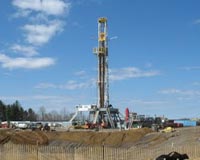The government has been under considerable pressure in recent years from members of the shale gas and oil industry, most notably Cuadrilla, to simplify the procedure to allow companies to access the significant reserves of shale gas and oil in the UK without allowing property owners to frustrate extraction projects. The government is in favour of development of the shale gas industry and is looking to legislate for what previously could only be negotiated by private agreement.
The proposed changes have been put forward in the Infrastructure Bill, and set out in a consultation paper published on 23 May 2014. These set out proposals for underground access for the extraction of gas, oil or geothermal energy, which include:
? a right for drilling companies to subterranean access to extract petroleum at a depth of at least 300 metres without requiring the permission of the surface landowner;
? an obligation to make community-wide payments to the areas affected by drilling arising from the above right; and
? a requirement for drilling companies to comply with a new public notification system.
Petroleum includes shale gas and oil and is therefore owned by the Crown. Shale gas is mainly methane and comes from shale rock. Most of the substrata of the UK has shale rock in it, and it is typically locked up in fine-grained sediments several hundred metres below the ground. The gas does not readily flow to a well, and it requires a special technique known as hydraulic fracturing, or “fracking” to access it.
Confines of the law
It has been a longstanding principle of English law that a freehold landowner owns “everything reaching to the very heavens and down to the depths of the Earth”. However, the landowner never owned petroleum because the Crown owns all rights to win coal, oil, gas and precious metals. The ability to extract it has always required private negotiation. Any interference by a third party of the ground under another’s property is technically a trespass, so currently companies require the permission of the landowner or a court order for underground access. This provides individuals with the power to halt a project. Companies are also concerned about the ability for individuals to purchase strips of land with the aim of frustrating shale gas developments. The proposed changes radically redefine what a freehold actually means.
Currently if companies are unable to negotiate with landowners they have to apply to the secretary of state who can refer the application to the High Court and despite the likelihood of access being granted, litigation is a costly and time-consuming process, which may hinder the growth of this industry. The proposed legislation will take away any protection of law a landowner may have enjoyed.
The right of underground access will allow companies to extract petroleum – or geothermal energy – from rock more than 300 metres below a property, without obtaining the landowner’s prior authorisation. Companies such as Cuadrilla have argued strenuously that activities this distance below the surface will not cause any inconvenience to a landowner. However, surface activities are likely to create disruption.
Local communities affected will receive a one-off compensation payment of £20,000 in return for access to the ground under properties in the area for each horizontal well over 200 metres in length. Wells can affect hundreds, or even thousands, of properties, so payments cannot feasibly be made to individual landowners. The government has supported this compensation scheme and believes that as the drilling occurs far below the surface, only a nominal payment is required.
A public notification system is also proposed and will provide information such as which communities are affected and therefore likely to receive compensation. However, affected residents can voice their objections only in the planning forum.
Companies will have to fulfil a number of conditions before the right of underground access can be granted. Companies will require petroleum and abstraction licences, planning permission and environmental permits, Health and Safety Executive-approved plans and drilling consent. The environmental regulators continue to measure and assess the environmental impact of the drilling, including related seismic activity and water pollution. Local planning authorities will have the usual powers to enforce adherence to planning conditions.
Inevitable pros and cons
The proposals have been met with considerable resistance from a number of environmental groups and landowners in areas likely to be affected by the proposed changes to the law. There is concern that relaxing the rules on fracking will hamper investment in renewable energy resources, withdrawing focus from the reduction of emissions. Others claim that fracking may cause contamination of ground and surface water from potentially carcinogenic chemicals and seismic activity, although this has not yet been proven (studies have indicated only small-scale seismic activity has occurred). Many landowners will not welcome the proposal to legislate what has previously only been possible through private negotiation.
Advocates for the change in the law argue that relaxing the rules of fracking would provide a vital energy source and reduce our over-reliance on other fossil fuels. The Institute of Directors estimates that the production of shale gas in the UK could create investment of £3.7bn and maintain approximately 74,000 jobs.
Research is still underway to establish whether fracking is economically viable depending on the location of the gas or oil. The consultation period closes on 15 August 2014. Watch this space.
Sarah Easton is a partner and Sue Lister is a senior associate at Thomson Snell & Passmore
The consultation is available at ?http://bit.ly/1pj7o4M










